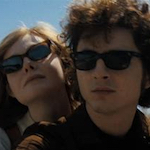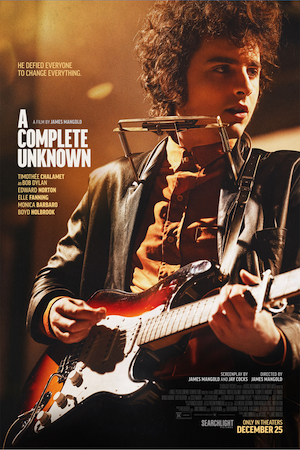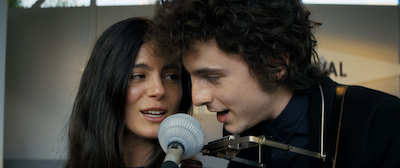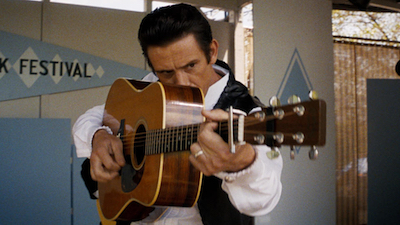 A dumb and insignificant pet peeve of mine: Every time a trailer comes out for a music biopic, I see a bunch of posts about “I can’t believe they still make these after WALK HARD.” Yeah, ‘cause that’s the way it always works. After there’s a good parody the whole genre ends. Couldn’t possibly be that this is a type of movie people enjoy.
A dumb and insignificant pet peeve of mine: Every time a trailer comes out for a music biopic, I see a bunch of posts about “I can’t believe they still make these after WALK HARD.” Yeah, ‘cause that’s the way it always works. After there’s a good parody the whole genre ends. Couldn’t possibly be that this is a type of movie people enjoy.
Well at any rate WALK HARD couldn’t stop the director of WALK THE LINE from returning to the scene of the crime. I’m not sure but there might even be a violation of the Prime Directive here, where the parodied has become aware of the parody, altering the course of the format. While everyone is making fun of biopics that try to explain a person and their art too neatly, A COMPLETE UNKNOWN seems to be arguing, even with the title, that Bob Dylan cannot, in fact, be explained.
Based on the book Dylan Goes Electric! by Elijah Wald (adapted by Mangold and Jay Cocks [STRANGE DAYS]), it uses the generally superior biopic approach of focusing on a particular slice of time – about 1961 to 1965 – instead of an entire life and career. A complete unknown Bob Dylan (Timothée Chalamet, HOSTILES) comes to New York to visit his idol Woody Guthrie (Scoot McNairy, D.E.B.S.) in the hospital. Pete Seeger (Edward Norton, ALITA: BATTLE ANGEL) is there looking after Woody, actually lets Bob in, lets him sing a song he wrote, is so impressed he invites him to come stay with his family. (For now on, measure all of your celebrity interactions against this one.) So we see Bob’s meteoric rise from random eccentric folky in the cafe to revered god of the folk movement, and then the build toward him shrugging off people’s expectations to do something else he’s more excited about.
 It’s possible (although I haven’t really heard this) that those people we know of who are super into Dylan will have issues with the movie that I wouldn’t. What I can confirm though is that it’s not a movie that’s only for people really into Dylan. I’ve never had an interest in Dylan or folk music at all, I have no context for this stuff beyond vague cultural awareness, but I found myself appreciating the many musical performances, thinking “that is a good song,” and getting involved in these lives and inter-artist dramas and what not.
It’s possible (although I haven’t really heard this) that those people we know of who are super into Dylan will have issues with the movie that I wouldn’t. What I can confirm though is that it’s not a movie that’s only for people really into Dylan. I’ve never had an interest in Dylan or folk music at all, I have no context for this stuff beyond vague cultural awareness, but I found myself appreciating the many musical performances, thinking “that is a good song,” and getting involved in these lives and inter-artist dramas and what not.
Not only is this one of the ones where all the actors have to do the singing, apparently they also played the instruments and performed everything live? That seems crazy, maybe it’s an exaggeration, but to my ears it does sound live, and it really works. Even setting that aside, I think Chalamet, taking this persona we know, this strange voice and cryptic behavior that have become such a caricature, and makes us see how that could be, like… just a dude you know. He meets and moves in with and later breaks up with fictionally named but based on a real person folk fan/painter/student Sylvie Russo (Elle Fanning, THE NUTCRACKER: THE UNTOLD STORY), and you can picture how yeah, young Bob Dylan could totally be somebody’s flaky artist boyfriend – charming and brilliant and frustrating and a pain in the ass and not a great roommate. I see why she loves him and also root for her to free herself of him. This aspect really reminded me of BASQUIAT.
We don’t have to do too much of the “here are the famous moments of the career” thing, but we do see him rise from impressive new guy at the open mic to hit records and tours, being swarmed by young women. He doesn’t seem to like that, yet he enjoys crafting an image as the cool guy with sunglasses riding a motorcycle, and he proceeds to be kind of right but kind of a baby about anyone trying to define him, whether it’s know-nothing industry people or know-everything music lovers.
 Of course he’s got temptations because he’s a superstar now and he records with and then goes on the road with dreamy Joan Baez (Monica Barbaro, TOP GUN: MAVERICK), who also finds him alternately attractive and annoying. I love the scene where Sylvie and Bob are on again after lots of heartache, she comes to see him at the Newport Folk Festival and is devastated when she sees how Joan and Bob are looking at each other during a duet. By my reading she has it wrong, Joan is completely fed up with Bob and telling him through this song that she’s done with him. On the other hand Sylvie is seeing this intimate artistic connection as they perform, maybe she just thinks she can’t compete with that. The thing that always plagues their relationship does not seem to be other women as much as Sylvie’s feeling that Bob keeps large portions of his life and emotions from her, trying to be a mystery even to her. And whatever that is they’re doing there, she knows she can never have it.
Of course he’s got temptations because he’s a superstar now and he records with and then goes on the road with dreamy Joan Baez (Monica Barbaro, TOP GUN: MAVERICK), who also finds him alternately attractive and annoying. I love the scene where Sylvie and Bob are on again after lots of heartache, she comes to see him at the Newport Folk Festival and is devastated when she sees how Joan and Bob are looking at each other during a duet. By my reading she has it wrong, Joan is completely fed up with Bob and telling him through this song that she’s done with him. On the other hand Sylvie is seeing this intimate artistic connection as they perform, maybe she just thinks she can’t compete with that. The thing that always plagues their relationship does not seem to be other women as much as Sylvie’s feeling that Bob keeps large portions of his life and emotions from her, trying to be a mystery even to her. And whatever that is they’re doing there, she knows she can never have it.
 The part of the movie I did have some context for and was most excited about was supporting character Johnny Cash. Mangold did that aforementioned movie about him with Joaquin Phoenix, but I think it’s so cool to see the subject revisited with a very different actor, Boyd Holbrook (who he’s directed in LOGAN and INDIANA JONES AND THE DIAL OF DESTINY). I heard Holbrook on the podcast Feeling Seen saying he was intimidated not only by having to live up to both Cash and Phoenix, but because he thought he looked nothing like Johnny Cash. Could’ve fooled me – he seemed taller than I think of Cash as being, but captured him so well, that deep voice and a particular swaggery side of him. And he looks way more like him than Joaquin did! Here Johnny becomes a pen pal and then IRL friend of Dylan (this really happened) and the movie uses him as a devil on Bob’s shoulder – an artistic outlaw devil stirring things up as good clean fun.
The part of the movie I did have some context for and was most excited about was supporting character Johnny Cash. Mangold did that aforementioned movie about him with Joaquin Phoenix, but I think it’s so cool to see the subject revisited with a very different actor, Boyd Holbrook (who he’s directed in LOGAN and INDIANA JONES AND THE DIAL OF DESTINY). I heard Holbrook on the podcast Feeling Seen saying he was intimidated not only by having to live up to both Cash and Phoenix, but because he thought he looked nothing like Johnny Cash. Could’ve fooled me – he seemed taller than I think of Cash as being, but captured him so well, that deep voice and a particular swaggery side of him. And he looks way more like him than Joaquin did! Here Johnny becomes a pen pal and then IRL friend of Dylan (this really happened) and the movie uses him as a devil on Bob’s shoulder – an artistic outlaw devil stirring things up as good clean fun.
The ultimately overruled angel is Pete, and I know nothing of the real guy but he’s such a compelling character here, a total sweetheart, meek in a lovable way, square as hell by modern standards (and for the time, I believe) but subversively so. He really believes in goodness and peace and artistic utopias, Mister Rogers with a guitar and a popular music festival. He’s also a dorky dad with funny kids and a cool wife named Toshi (Eriko Hatsune, NORWEGIAN WOOD) who, in contrast to Sylvie with Bob, gets to be directly involved with all of Pete’s work as a producer and director. (Some fault the movie for not going into detail about that – check out Merrill Markoe’s piece The Ballad of Toshi).
It’s a good looking movie by the way, shot by Mangold’s regular d.p. Phedon Papamichael (STRIPPED TO KILL 2: LIVE GIRLS), designed by his regular production designer François Audouy (ABRAHAM LINCOLN: VAMPIRE HUNTER, DRACULA UNTOLD). I looked it up and I think it’s shot digitally, but they put some grain on it. That’s all I ask.
Obviously this made me curious to read up a little on some of this stuff. Seems like pretty accurate in broad strokes, while obviously moving things around, dramatizing, and knowingly playing with famous legends and tall tales (specifically a thing about Pete considering cutting Bob’s power using an ax) in keeping with Dylan’s history of self-mythologizing. It’s really funny to see a crowd violently outraged by a dude playing an electric guitar (and then snapping right out of it when he goes back to acoustic?). I have to believe this is at least a little exaggerated, though they do take pains to show that at least for some of them it comes from a deep passion for what folk music represents to them and not a “your rock ‘n roll is too loud!” type situation, and also that some people in the crowd are into what he’s doing. You and I would’ve been those open-minded fans, right? We’re cool. We would’ve gotten it.
Undoubtedly this is highly fictionalized, but I think in its overall attitude it’s not as full of shit as some of the biopics. It obviously takes the position (and makes a strong argument for) Dylan being a unique, visionary talent. But it also humanizes him as just a dude, and kind of a brat, an annoyance sometimes to the people who live and work with him, as much as they love him. It doesn’t stack the deck to make his doubters cartoonishly wrong. We see behind-the-scenes debates with the folk festival planners, including Norbert Leo Butz (THE EXORCIST: BELIEVER) as ethnomusicologist Alan Lomax, and when they’re very wrong they’re not doing the “Picasso will never amount to a thing, trust me” thing. Maybe Alan should be more open to this band that Bob vouches for, but he seems to be coming from the legitimate point-of-view of wanting to preserve blues as a Black artform. The original Blueshammer hater. You gotta respect it.
And you also gotta respect Bob coming from a different place, an unknown one, possibly with a carnival background, but possibly he made that up. Images and ideas come to him and he follows his instincts and puts them out there for us to slightly understand, mostly puzzle over. Hard to explain, easy to enjoy, once I paid attention. Makes for a pretty good movie.


























February 18th, 2025 at 9:14 am
I too have no particular allegiance to or interest in Dylan, but I generally like Mangold’s movies, and I liked this. Moreover, I saw it with a couple of Dylan fans who liked it more than I did. Mangold for me is at his best when he is boiling a story down to a western, and while I don’t feel Dylan actually lends himself easily to that, Mangold very explicitly starts this with a stranger riding into town, coming to disrupt the status quo.
But yeah, Boyd Holbrook as Johnny Cash lifted the whole movie for me and made me wish we could have had more of the disruptive troublemaker Johnny Cash in WALK THE LINE. I still think there’s a movie I’d want to watch in the life story of Kris Kristofferson and I can imagine Mangold giving us yet another different Cash for that. Although the obvious story for Mangold to tell now is the Rick Rubin-Johnny Cash story, with say, Russell Crowe as old, defeated Cash (an Australian for the American recordings!).
It’s interesting to read this take on the portrayal of Alan Lomax too, as I thought the movie made him out to be the villain here, and that felt deeply unfair. I don’t know or care much about folk music, but much of what I do know comes from the efforts of Lomax and his commitment to equality and the validity of different musical cultures.